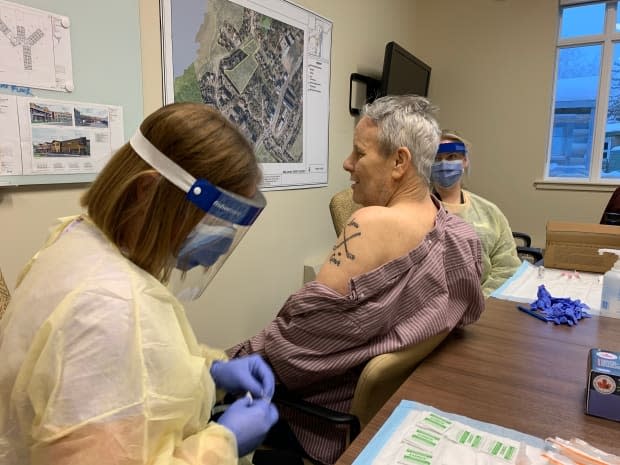N.W.T. starts administering COVID-19 vaccines
Residents and staff of the Jimmy Erasmus Seniors Home in Behchokǫ̀ and AVENS Manor in Yellowknife were among the first group to get the Moderna COVID-19 vaccine today in the N.W.T. as the government began providing the vaccine to residents.
A health team from the Northwest Territories Health and Social Services Authority (NTHSSA) that included logisticians, nurses and translators, went to the two long-term care facilities to help local health care staff deliver the vaccine.
Yellowknife resident Bruce Jonasson was the first senior in the AVENS Manor to get the Moderna vaccine.
"I fixed it with the head nurse last night to be the first and away we went," Jonasson said with a laugh hours after he received the vaccine.
Driven by fame to be the first in line, Jonasson said he wanted to be in the media for all his grandchildren to see.
"If everyone in the world gets one, we will be good … it makes you feel good and makes you feel like there is progress in our abysmal lives," he said.

"I am pleased with how the first day of our vaccination rollout has gone and excited about the months ahead as we work to vaccinate the rest of our eligible population," said N.W.T. Health Minister Julie Green in a government news release.
The N.W.T. received 7,200 doses of the Moderna vaccine on Dec. 28 and stored them at the Stanton Territorial Hospital as government officials finalized its plan to distribute the vaccine across the territory.
Priority groups
According to the Office of the Chief Public Health Officer residents and staff at long term care facilities are a priority to get the vaccine as they are at the highest risk of contracting the disease.
The release listed the following as priority groups to get the vaccine:
• Those advanced in age— the risk of COVID-19 severity starts to increase after age 60. Most vulnerable in this category are those who live in long-term care facilities or in shared living environments.
• Those with existing chronic disease and multiple medical conditions — residents with conditions like chronic lung, kidney, or heart disease are at greater risk for experiencing severe form of COVID-19 and its complications. Those who travel outside the NWT regularly for medical care are at even greater risk.
• Those who could potentially transmitting COVID-19 to those at high risk of severe illness and death are another priority group. This risk group may include frontline health care workers, or those who provide care to high risk vulnerable populations.
• Resident workers who live in the N.W.T., but work regularly outside the N.W.T. or at work camps with out-of-territory workers. They are at elevated risk of acquiring COVID-19 and transmitting to family, household members or those in the community.
• Those living in a remote community, including Indigenous communities, with limited health infrastructure in comparison to larger centres.
The release stated these priority groups will get the vaccines "in a phased approach that will be expanded to the entire eligible N.W.T. population as supply increases."
At a news conference on Wednesday, Chief Public Health Officer Dr. Kami Kandola said the rest of the population, including herself, will likely get their first shot of the two-dose vaccine sometime in March, with the second dose to follow 28 days later in April.
'It's important we all play our part'
The N.W.T. expects to receive and administer 51,000 doses in the first three months of 2021, which is enough to vaccinate 75 per cent of the adult population.
The Moderna COVID-19 vaccine was chosen as the most viable one in all three territories in the North because it's easier to ship and store than the Pfizer-BioNTech vaccine.
"It has been our commitment to evidence-based decision making, and to listening to the advice of our medical professionals and those in the scientific community that we are on the cusp of beginning to overcome one of the biggest challenges our society has ever faced," said Premier Caroline Cochrane.
Green noted that while vaccinations are not mandatory, uptake will be very important to protect those who can't get the vaccine, including people who are pregnant, immunocompromised and less than 18 years old.
"It's important we all play our part in returning the North to life as we knew it before the pandemic and get vaccinated for the safety of our loved ones," she said.
Behchokǫ̀ elder Caroline Douglas agreed. She received her vaccination Thursday, and said she encouraged others to get the vaccine as well.
"I told them you should get the needle if you're not sick," Douglas said. "It's just dangerous, COVID-19. It's coming closer and we get visitors. Our families, sometimes they go to Yellowknife and they come visit us."
"You never know who's got the virus."

